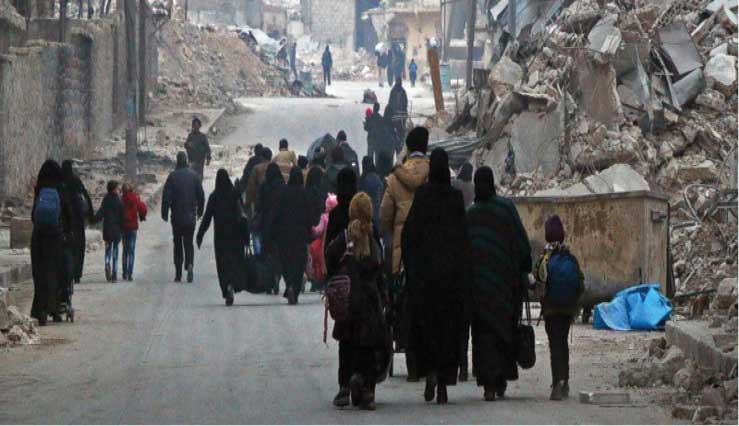
In 2016, we submitted to the UN Mechanisms 68 communications regarding 66 individuals.


In 2016, we submitted to the UN Mechanisms 68 communications regarding 66 individuals.

 Our Concerns
Our Concerns Recommendations
Recommendations Upcoming
UpcomingIn March 2016, Syria entered its sixth year of armed conflict. The UN Special Envoy for Syria, Staffan de Mistura, estimated the death toll at 400,000, almost double what it was estimated to be two years ago. At the end of the year, the Office of the High Commissioner for Refugees announced that over 4.8 million people had fled Syria since 2011, seeking safety in neighbouring countries, particularly in Lebanon, Jordan, Iraq, and Turkey, as well as in Europe and Canada. Millions more, who continue to bear the brunt of this violent conflict, are displaced inside the country.
The conflict escalated at an alarming rate due to the interference and intervention of foreign actors, as well as the widespread clashes between governmental forces, various armed opposition groups, and the Islamic State (IS). Over the past year, Russian airstrikes have intensified, indiscriminately bombing civilian areas, while the Syrian army and foreign militias, including those originating from Iran and Lebanon, have committed massacres, extrajudicial executions, enforced disappearances, and systematic torture. Rebel groups similarly continued to commit serious violations of both international humanitarian law and human rights. Although the UN Security Council has directly – and repeatedly – accused Russia and the Syrian government of war crimes, the latter have thus far gone unpunished.
On 15 December 2016, the Syrian army took control of Aleppo, including the eastern part of the city, which was almost entirely destroyed as a result of an intensive bombing campaign by Russian aircrafts. Four days later, the UN Security Council unanimously adopted Resolution 2328, demanding “complete, immediate, unconditional, safe and unhindered access” to monitor evacuations from the eastern district of Aleppo.
Finally, despite the attempts to negotiate a political solution, the peace process remained blocked. While the international talks held in Geneva on 1 February 2016 raised prospects for peace, the “cessation of hostilities” accord, adopted unanimously in UN Security Council (UNSC) Resolution 2268 on 26 February, broke down on 19 September 2016. Since then, the UNSC’s attempts to adopt resolutions for a ceasefire in Syria have failed repeatedly on account of Russia’s veto, despite the pressing humanitarian situation. International talks on Syria remain deadlocked as the parties fail to reach agreement on, among others, the fate of President Bashar Al Assad.

In 2016, international humanitarian law continued to be blatantly violated in Syria. Governmental forces and affiliated militias supported by Russia conducted indiscriminate attacks on densely populated areas, causing thousands of civilian deaths. The authorities made use of chemical weapons, barrel bombs, cluster munitions, as well as weapons whose effects are of an indiscriminate nature and the use of which is thus prohibited under international humanitarian law and by UN Security Council Resolution 2139 (2014). These attacks against civilians have been expressly qualified as war crimes by the UN Security Council.
On 25 June 2016, the authorities launched the “battle of Aleppo” in an attempt to take back control of the eastern part of the city. On 18 October, the Syrian army besieged Eastern Aleppo as Russian jets launched a fierce aerial bombardment of the area. Consequently, the city’s two largest hospitals were destroyed; killing dozens and leaving thousands of civilians without access to necessary medical care. UN Secretary General Ban Ki-Moon has denounced the airstrikes targeting hospitals and other healthcare facilities as “war crimes”.
On 15 November 2016, while more than 250,000 civilians remained trapped in the besieged city, with dwindling food supplies and extremely limited medical care, Russia announced a major offensive on Eastern Aleppo. As a result, in the last week of November, tens of thousands tried to escape the city, which, according to Stephen O’Brien, the UN Under-Secretary-General for Humanitarian Affairs, has become “a giant graveyard”.
Furthermore, hospitals and healthcare facilities under the control of opposition forces have systematically formed the object of direct attacks by governmental forces, particularly following the government’s decision to declare “illegal” any healthcare facility providing medical care in the areas controlled by opposition forces. The situation has deteriorated rapidly since the authorities have continued to prevent the passage of all humanitarian aid, despite their commitments to do otherwise.

The systematic practice of enforced disappearance constitutes, without a doubt, a crime against humanity within the meaning of the Rome Statute. In 2016, figures have continued to rise steadily, reaching tens of thousands of victims. The practice forms a tool of repression, which targets not only political activists, human rights defenders, and members of humanitarian organisations, but also ordinary citizens.
Most victims are apprehended at military checkpoints or during waves of arrests conducted by State security services or militias, without any warrant or justification as to the reasons for their arrest. Following their arrest, victims of enforced disappearances are taken to secret detention facilities where they are severely tortured and, in some instances, summarily executed. The systematic resort to this practice creates a climate of terror, as a result of which families of the victims are afraid to denounce the disappearance in fear of being subjected to a similar fate. In the rare cases in which families can refer to local authorities, they are faced with the latter’s systematic denial of any knowledge of or involvement in these disappearances.
In 2016, Alkarama and Human Rights Guardians submitted approximately 60 cases to the UN Working Group on Enforced Disappearances (WGEID), despite the increasing difficulties faced by lawyers, activists, and the families of victims when documenting cases on the ground. As of August 2016, there were approximately 190 cases still outstanding before the WGEID. Alarmingly, these cases represent only the tip of the iceberg, with tens of thousands of families remaining without any news on the fate and whereabouts of relatives who were arrested or abducted by governmental security forces or foreign militias. Alkarama has also raised several cases of enforced disappearances committed by other armed groups, including IS, the Al Nusra Front, and the Kurdish People’s Protection Units, to the Independent International Commission of Inquiry.

In 2016, torture remained a generalised and systematic practice, committed by both government security services and State-sponsored militias in all official detention centres, as well as in places of secret detention. Torture and other cruel, inhuman or degrading treatment are perpetrated against all detainees without exceptions. This includes individuals suspected of having participated in demonstrations, supporting the opposition, or being members of armed groups, as well as journalists, human rights defenders, defectors of the security forces, women and children. The practice of torture is encouraged by a lack of political will to address the issue; conducted under the direct orders of the authorities, it is part of the State’s policy to instil fear, to intimidate and terrorise the civilian population.
Several cases documented by Alkarama in 2016 attest to the recurrent and pervasive use of torture in Syrian prisons, as well as in the regime’s multiple secret detention centres. The frequency, duration, and gravity of the ill-treatment – perpetrated by all branches of the security services – have led to thousands of deaths in custody. On 1 August 2016, Alkarama referred the case of Ahmad Hassoun, a 19-year-old Syrian activist who died in captivity after having been severely tortured, to the UN Special Rapporteur on extrajudicial executions. As is often the case, Ahmad’s father was ordered to sign a document stating that his son had died “because of a heart attack” and was never able to collect his son’s death certificate. As highlighted in a report of the Syrian Commission of Inquiry “Out of sight, out of mind”, published in February 2016, thousands of individuals have been beaten to death or have died as a result of severe injuries sustained during torture. Others have died because of general prison conditions and a denial of access to medical care.

2016 saw the review Syria by the Human Rights Council (HRC) in the framework of its second Universal Periodic Review (UPR). The UPR consists in a review of the human rights record of all UN Member States by the HRC in four-year cycles and takes place through an interactive discussion with other UN Member States. NGOs can submit information, which may be referred to by any of the States taking part in the review.
On 4 November 2016, the Working Group on the UPR adopted a preliminary report containing the recommendations made to Syria by UN Member States during the review, which took place on 31 October 2016. A large majority of States expressed their concerns over the gross violations of international humanitarian law and human rights, the widespread practice of torture, arbitrary detentions and enforced disappearances, attacks against civilians and civilian objects, including hospitals, and the lack of cooperation with the UN, citing in particular the Independent International Commission of Inquiry. Alkarama previously raised all these issues in a report submitted to the HRC ahead of Syria’s review in March 2016.
Syria was further recommended to “take immediate measures to cease indiscriminate attacks against civilians, hospitals, their personnel and humanitarian convoys”, to “ensure full and unhindered humanitarian access including in all besieged areas”, and to “redouble its efforts towards reaching a political settlement to the crisis in Syria through a comprehensive dialogue with all parties”.
Overall, Syria received 231 recommendations from UN Member States, which the country will have to consider before March 2017, when it must inform the Human Rights Council of whether these are accepted or rejected.